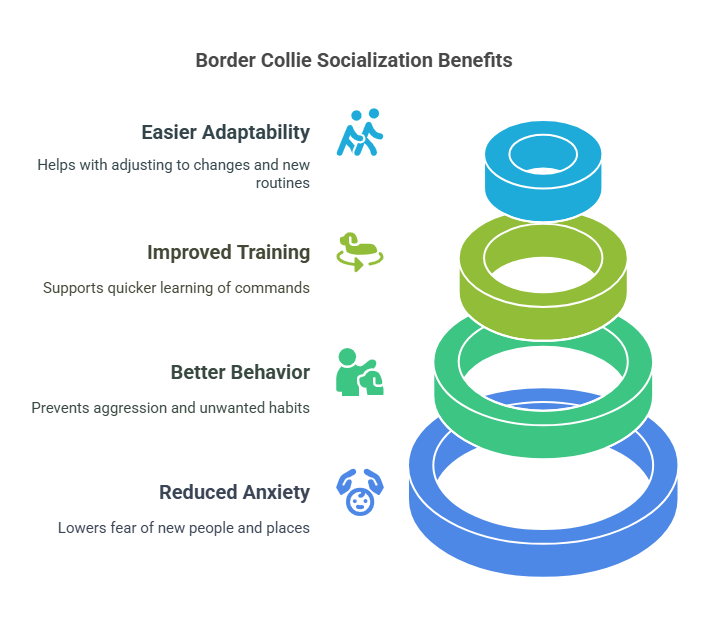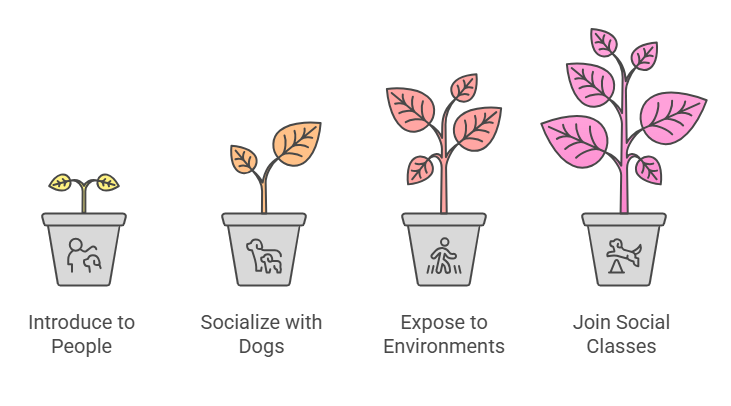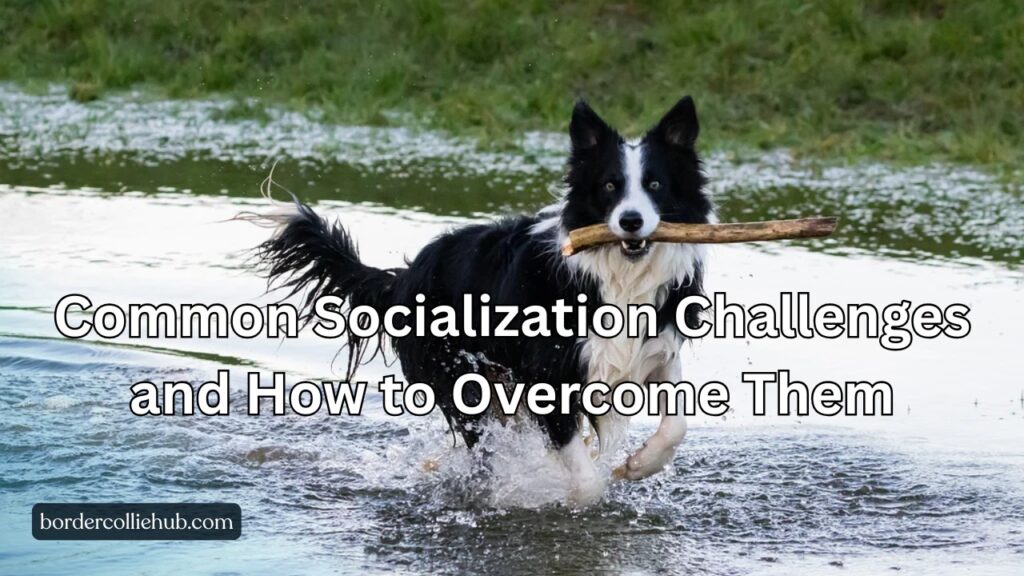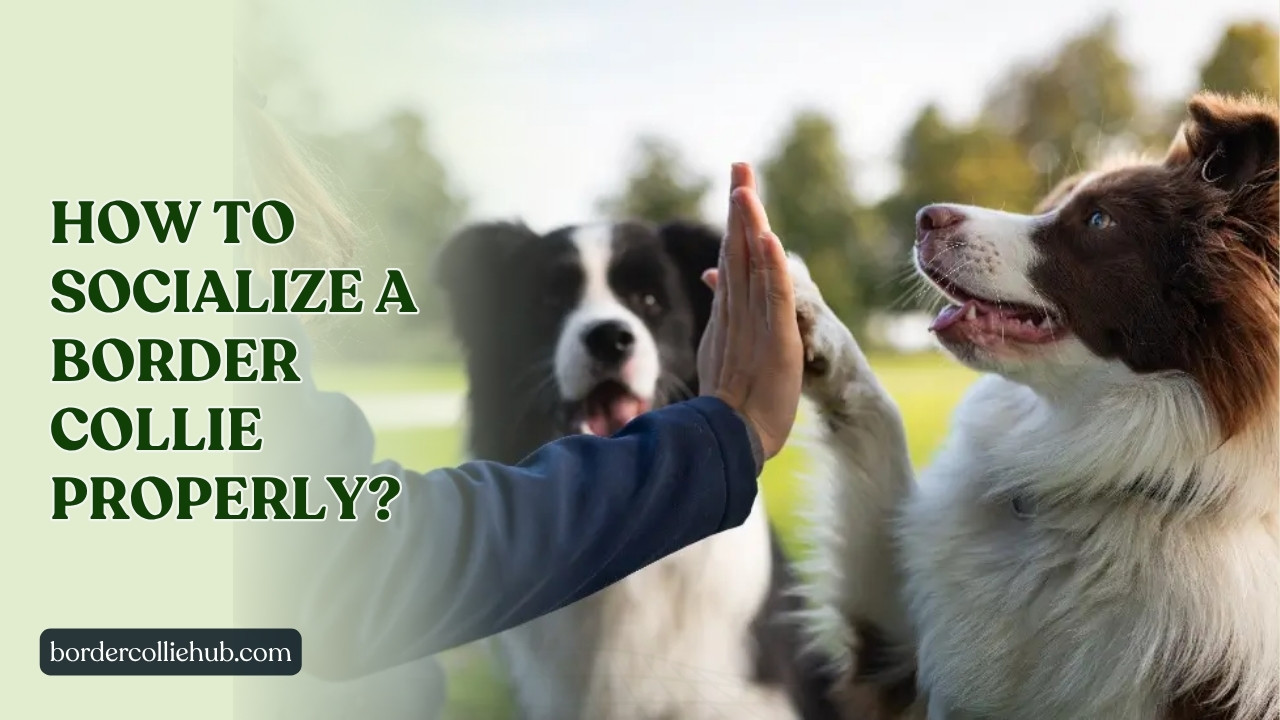How to socialize a Border Collie properly: Start early, introduce your dog gently to new people, pets, and environments, and use positive rewards to build confidence and good behavior. Consistent, patient practice helps your Border Collie grow into a happy, well-adjusted companion.
Socializing a Border Collie can feel tricky because these dogs are smart and energetic, but they also need careful handling to avoid fear or aggression. Many owners struggle to know when and how to begin. If you want simple, clear steps to help your Border Collie get comfortable with new sights, sounds, and friends, you’re in the right place. This guide will walk you through easy methods and helpful tips to make socializing a positive experience for both you and your dog. Let’s dive in and explore each step with practical advice you can start using today.
Why Socialization is Crucial for Border Collies
Border Collie’s Temperament and Intelligence
Border Collies are known for being one of the smartest and most energetic dog breeds. Their sharp minds and strong work drive mean they need a lot of mental and physical stimulation. Without proper socialization, these traits can sometimes lead to anxiety, fear, or unwanted behaviors like excessive barking or chasing. Socializing your Border Collie helps them learn how to behave calmly around new people, other dogs, and different environments.
Socialization trains their brains to stay relaxed and confident in new situations. It helps prevent fear or aggression, which are common in dogs who haven’t met enough new experiences early in life. To learn more about the breed’s personality and needs, you can visit the American Kennel Club’s Border Collie page.
Benefits of Proper Socialization

When you socialize a Border Collie correctly, you’ll notice many positive changes in their behavior and health. Here are some key benefits:
- Reduced Anxiety and Fear: A well-socialized dog feels more secure and less stressed in new places or with strangers.
- Better Behavior: Socialized dogs are less likely to develop aggression or bad habits.
- Improved Training Success: Dogs who know how to interact calmly with others learn commands faster.
- Easier Adaptability: Your dog will be more comfortable during vet visits, trips, or visits to dog parks.
The table below summarizes the main benefits of socializing a Border Collie:
| Benefit | Description | Impact on Dog |
|---|---|---|
| Reduced Anxiety | Lowers fear of new people and places | Calmer and happier behavior |
| Better Behavior | Prevents aggression and unwanted habits | More obedient and easy to handle |
| Improved Training | Supports quicker learning of commands | Smarter, more responsive dog |
| Easier Adaptability | Helps with adjusting to changes and new routines | Stress-free visits and social events |
For more details on dog socialization benefits, the Humane Society offers excellent advice and resources.
When to Start Socializing Your Border Collie
The Critical Socialization Window (3-14 Weeks)
The best time to start socializing a Border Collie is early—usually between 3 and 14 weeks of age. This period is called the “critical socialization window.” During this time, puppies are more open to new experiences and learn faster how to handle the world around them. Introducing your puppy gently to different people, dogs, sounds, and places helps them develop confidence and good manners.
If socialization is missed or limited during this window, dogs may become fearful or shy later. Early socialization creates a strong foundation for lifelong positive behavior. For puppy owners, the American Veterinary Society of Animal Behavior recommends controlled, positive exposure to a variety of experiences during this stage.
Socialization for Adult Border Collies
If you have an older Border Collie that wasn’t socialized early, don’t worry. It’s still possible to teach them social skills, though it may take more time and patience. Adult dogs can learn to enjoy new experiences through slow, gentle exposure and positive reinforcement.
Adult socialization focuses on reducing fear and building trust. Avoid forcing interactions, and always watch for signs of stress. With steady work, even shy or reactive adult Border Collies can improve their comfort around people, other dogs, and busy environments.
Step-by-Step Socialization Techniques for Border Collies

Introducing Your Border Collie to New People
When you meet new people with your Border Collie, start slow and calm. Let your dog approach strangers at their own pace. Avoid forcing interactions. Use treats and praise to create a positive link between meeting new people and good feelings. This helps your dog stay relaxed and open to meeting others.
Be mindful if your dog seems nervous or shy. Take a break and try again later with smaller groups or quieter settings. Teaching your Border Collie to sit calmly before greeting someone helps set clear expectations. You can learn more about meeting new people safely in dog socialization from the American Kennel Club.
Socializing with Other Dogs and Pets
Introducing your Border Collie to other dogs needs care and attention. Pick calm dogs for first meetings. Meet in neutral places like a park or open yard. Watch body language closely to make sure both dogs feel safe.
Keep initial meetings short and positive. Use treats to reward calm behavior. If your dog shows signs of stress, like growling or stiff body posture, separate them and try again slowly. Introducing your dog to other pets, like cats, should also be gradual and supervised. For detailed tips, check out ASPCA’s guide on dog introductions.
Exposure to Different Environments and Stimuli
Border Collies need to get used to many sounds and places. Walk your dog in parks, busy streets, and near vehicles. Let them see bicycles, children playing, and other everyday sights. Keep these sessions calm and use treats to reward calm behavior.
Avoid overwhelming your dog. If they seem scared, move to a quieter spot and try again later. Gradual exposure builds confidence. Playing soft background music or using noise CDs can help dogs get used to loud sounds at home. The Cesar’s Way website offers great ideas for controlled exposure.
Puppy Socialization Classes and Playgroups
Puppy classes and social playgroups offer structured socialization. These classes help your dog learn manners while meeting other puppies. Trainers guide safe interactions and help correct bad behavior gently.
Choose a class that uses positive reinforcement and small groups. This keeps puppies from getting too stressed or aggressive. Classes also teach owners how to keep socialization fun and safe at home. Find local classes on websites like Petfinder.
Common Socialization Challenges and How to Overcome Them

Fearfulness or Aggression During Socialization
Fear or aggression is common when dogs face new experiences too fast. Signs include growling, barking, or hiding. If your Border Collie reacts this way, slow down the process. Use smaller steps and more positive rewards.
Avoid punishment, which can worsen fear. Instead, try desensitization by exposing your dog to mild versions of the trigger and rewarding calm behavior. Over time, your dog learns to relax. The American Veterinary Society of Animal Behavior provides helpful resources on handling fear in dogs.
Overstimulation and Hyperactivity
Border Collies have lots of energy, but too much stimulation can cause them to act out or become anxious. Watch for signs like pacing, barking, or jumping. When this happens, give your dog a break in a quiet area.
Regular exercise and mental games help reduce excess energy. Using calm training methods and quiet time after socialization sessions helps your dog stay balanced. Learn more about managing hyperactivity at the ASPCA.
Socialization Setbacks and Regression
It’s normal for dogs to sometimes seem like they take a step backward during training. Stressful events or changes can cause this. Stay patient and keep practicing gently.
Return to easier social situations before moving forward again. Consistency and calm encouragement help your dog regain confidence. Maintaining a daily routine of short socialization exercises prevents setbacks. The American Society for the Prevention of Cruelty to Animals offers tips on dealing with setbacks.Tips for Successful Socialization of Your Border Collie
Consistency is Key
Socializing your Border Collie takes regular effort. Try to include social experiences every day, even if only for a few minutes. This keeps your dog used to meeting new people, dogs, and places. Consistency helps turn socialization into a habit, making your dog more confident over time.
Try to keep socialization positive and avoid rushing. Daily walks, visits to dog-friendly stores, or meeting friends with dogs all add value. According to PetMD, frequent, calm exposure is essential for building good social skills.
Use of Positive Reinforcement
Positive reinforcement means rewarding good behavior with treats, praise, or play. This encourages your Border Collie to repeat those actions. When your dog stays calm around new people or dogs, give them a tasty treat or gentle praise.
Avoid punishment, which can make your dog fearful or confused. Positive methods help your dog associate social situations with fun and safety. For tips on positive training, see The Humane Society’s guide.
Patience and Observing Your Dog’s Limits
Every Border Collie is different. Some may take longer to feel comfortable in social settings. Watch your dog’s body language carefully. Signs of stress include yawning, licking lips, or turning away.
If your dog seems overwhelmed, give them space and time to relax. Don’t force interactions. Let your dog set the pace to avoid setbacks. Patience builds trust and makes socialization more effective.
Involving Family and Other Caregivers
To keep socialization consistent, all family members and caregivers should follow the same training plan. This helps your Border Collie understand what is expected and avoids confusion.
Share socialization tips and reward strategies with everyone who interacts with your dog. The more consistent the approach, the quicker your dog will learn good social skills. You can find helpful advice on involving family in training at AKC’s family dog resource.
Conclusion
Properly socializing your Border Collie is one of the best gifts you can give your dog. Starting early and using gentle, positive methods helps your dog grow into a confident, happy, and well-behaved companion. Remember to be patient and consistent, allowing your Border Collie to learn at their own pace. Every small step you take builds a stronger bond and a calmer, friendlier dog.
By following the simple steps in this guide—introducing your dog to people, other pets, and new environments regularly—you set your Border Collie up for a lifetime of good behavior and joyful interactions. If you keep socialization fun and positive, your dog will thank you with loyalty and love.
If you have questions or want to share your experiences, feel free to leave a comment below. Happy socializing!
FAQ
How long does it take to socialize a Border Collie?
Socialization is a continuous process, but most dogs show big improvements after several weeks of regular practice.
Can a Border Collie be socialized if adopted as an adult?
Yes! Adult dogs can learn social skills too, but it takes patience, slow exposure, and lots of positive rewards.
What are the signs of poor socialization?
Common signs include fear, aggression, and anxiety when your dog meets new people, dogs, or situations.
Are socialization classes necessary?
Not always, but classes offer a safe, controlled place for your dog to meet others and learn good manners faster.
How do I handle aggressive behavior during socialization?
Take things slow, use positive rewards for calm behavior, and ask a professional trainer for help if needed.
Can socialization prevent behavior problems?
Yes. Early socialization helps lower fear, anxiety, and aggression by making your dog more confident and relaxed.
